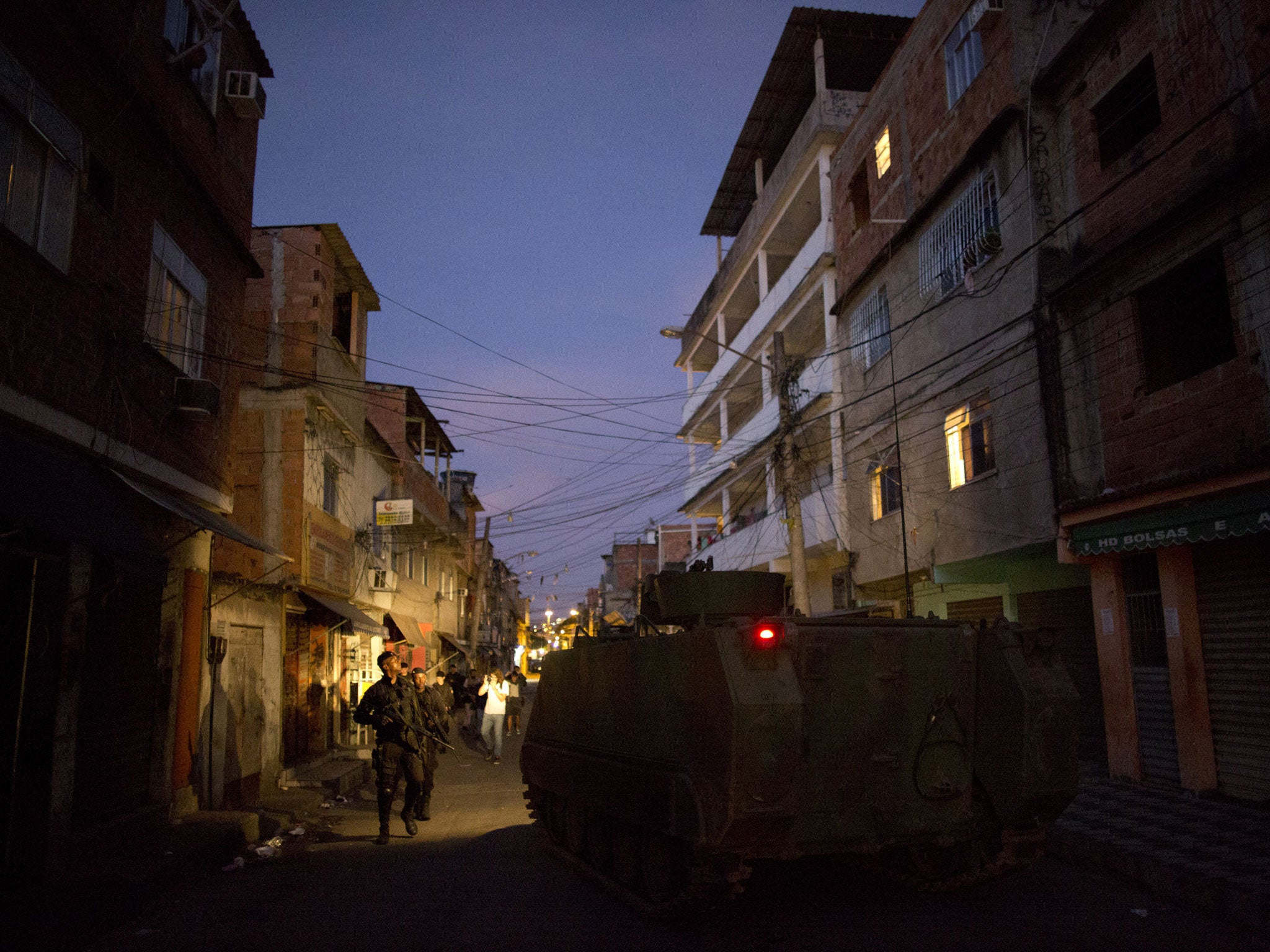World Cup 2014: Rio governor calls in army to take back the favela slums ahead of football tournament
Brazilian city’s governor calls in army to regain control of lawless slums and reduce threat of violence to football fans

It took just 15 minutes for more than 1,000 military police to occupy one of the most violent shanty towns in Rio de Janeiro, as dawn was breaking on Sunday morning.
Not one shot was fired during the operation to bring peace to the slum as 21 armoured vehicles rolled into the sprawling favela in the north of Rio. They were accompanied by trucks deploying hundreds of police patrols; pickups carrying more officers with weapons held aloft; the mounted regiment and the dog unit.
More than 130,000 people live in the Complexo do Mare, which has for years been ruled by ruthless drug trafficking gangs.
With the World Cup just two months away, the favelas represent the biggest security crisis facing Rio since it launched the police pacification units (UPPs) programme five years ago. The initiative reclaims lawless territory ruled by drug traffickers in the capital’s slums and replaces it with a police presence.
Authorities are hoping to prevent violence in the city’s worst favelas affecting the city during the World Cup, threatening the hundreds of thousands of visitors.
In Pictures: Rio's Favelas ahead of the World Cup
Show all 7For the past 10 days the slum lords and criminal elements have been under siege as Rio’s governor, Sergio Cabral, finally admitted the city needed help to restore law and order on its streets. He called on Brazil’s President Dilma Rousseff to send in the army. Thousands of troops are expected to arrive this week to continue the peace process, and will stay indefinitely.
The decision to take control of Complexo do Mare followed weeks of attacks on officers patrolling the city’s shanty towns, as well as frequent gun battles, random deadly attacks, bus burnings, bombings and barricades set on fire. Seven officers have been killed since the start of the year.
The situation has been exacerbated by high-profile extra-judicial killings of slum dwellers by the police. Twenty-five officers will stand trial this year over the disappearance and murder last July of Amarildo, a labourer from the Rocinha favela; and another three officers were arrested this month after they were caught on camera dragging the body of a dying woman 350 metres along a road from the back of a police van. Witnesses from the Congonha favela where the victim, Claudia da Silva Ferreira, lived allege that officers shot her and tried to cover up the deed.
Mr Cabral said of the attacks on police: “This is a clear attempt [by drug traffickers] to demoralise us, to discredit the pacification process and reclaim the occupied territories that are now held by the police. The [criminals] want us to retreat. But we will push forward and will not be deterred.”
There have been several high-profile arrests since the start of the operation 10 days ago, including Mare’s drug kingpin, Marcelo Santos das Dores. He was caught, following an undercover intelligence operation, living in a £1,000-a-month luxury home.
More than 100 people have been arrested in Mare. Hundreds of kilograms of cocaine, marijuana and pills have been seized, along with ammunition and stolen motorbikes.
Mare is located at a strategic point in the city and will become the 39th district to be pacified by police. It is near to Rio’s international airport and has three main highways running by it.
On Saturday, gangs of youths threw stones at passing cars, stopping and robbing them. As police gave chase, the youths escaped through gaps in the fence into the rabbit-warren lanes of Mare.
Aiming to reassure residents of the favela on Sunday, Mr Cabral issued a televised message. “This is a permanent message of security,” he said. “Police are here to help you and to do their work within the law. The security is here to stay.”
The operation was welcomed by residents, who have long suffered under the grip of drug gangs. Hundreds gathered in the local square to welcome the police. Children were given rides on police horses and locals chatted to officers as they were shown around the armoured vehicles.
Carlos Henrique Silva, 35, who took his two-year-old daughter Kaila to see the police raise their flag as a symbolic gesture, said: “It’s a climate of peace that we have not seen for many years. I have waited for a long time to see this. I guess this is the beginning of a new era. I don’t know what our lives will be 30 years from now, but right now, we’re very happy.”
Subscribe to Independent Premium to bookmark this article
Want to bookmark your favourite articles and stories to read or reference later? Start your Independent Premium subscription today.

Join our commenting forum
Join thought-provoking conversations, follow other Independent readers and see their replies